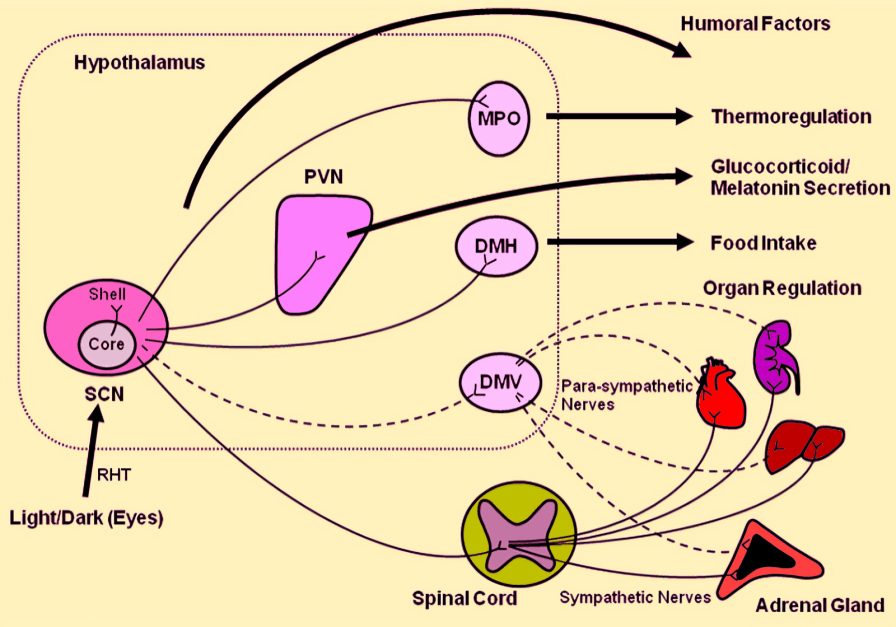
“
Hypothalamic Disorders (e.g., Diabetes Insipidus) affect the brain's command center for vital functions like thirst, temperature, appetite, and hormone release. These disorders arise from trauma, tumors, infections, or genetic mutations disrupting hypothalamic regulation. One prominent example, Diabetes Insipidus, occurs when the hypothalamus fails to produce or regulate antidiuretic hormone (ADH), leading to intense thirst and frequent urination. 1
1
”
The hypothalamus regulates antidiuretic hormone (ADH) production, and its impairment may lead to central Diabetes Insipidus, causing excessive thirst and dangerously high volumes of diluted urine daily.1
Trauma to the brain, particularly after surgery or injury near the pituitary region, may damage the hypothalamus and disrupt hormone signals, potentially resulting in conditions like diabetes.2

Hypothalamic disorders may impact body temperature regulation, causing fluctuating fevers or cold intolerance, as the hypothalamus acts as the body's natural thermostat and metabolic balance.
Tumors like craniopharyngiomas or gliomas can affect the hypothalamus, causing hormonal issues like delayed puberty, obesity, or central diabetes insipidus.3
Diabetes Insipidus, caused by hypothalamic malfunction, affects water balance—not blood sugar. It's often misdiagnosed until ADH tests confirm the brain's failure to produce or signal antidiuretic hormone correctly.4
Congenital hypothalamic defects may emerge in infancy or childhood, resulting in developmental delays, hormone deficiency, or fluid imbalance commonly resembling features of Diabetes Insipidus.5
Infection or inflammation of the brain, such as meningitis, can inflame the hypothalamus, disturbing its hormone-regulating role and sometimes triggering transient or permanent Diabetes Insipidus symptoms.6
Hypothalamic disorders can disrupt thirst regulation, causing either reduced or excessive fluid intake. This imbalance may concentrate or dilute body electrolytes, increasing the risk of cellular dysfunction. 7
Genetic mutations like those affecting the AVP gene can lead to familial forms of central Diabetes Insipidus, where hypothalamic cells fail to produce adequate ADH even from early childhood. 8

Headaches, vision changes, or sudden weight gain without diet changes can be early symptoms of hypothalamic tumors, often progressing to more complex issues like Diabetes Insipidus.
In rare cases, autoimmune diseases can mistakenly attack hypothalamic tissue, resulting in inflammation and hormonal loss that mimics or leads to water balance disorders like central Diabetes Insipidus. 9
Surgical removal of pituitary tumors may damage nearby hypothalamic structures, leading to hormone issues like central diabetes insipidus or problems with temperature regulation.10
Diabetes Insipidus requires distinct treatment from diabetes mellitus. The synthetic hormone desmopressin is commonly prescribed to mimic ADH when the hypothalamus fails to produce enough naturally. 11
People with hypothalamic disorders may experience unstable sleep-wake cycles. This condition, linked to hypothalamic circadian rhythm regulation, often coexists with ADH disorders in neuroendocrine syndromes. 12
Hypothalamic hamartomas—benign brain malformations—can affect hormonal signals, appetite, and water regulation, often presenting early in life with seizures or central Diabetes Insipidus-like features. 13

Emotional imbalance or behavioral shifts can arise from hypothalamic disorders due to disrupted regulation of mood-related hormones like oxytocin, sometimes compounding the effects of water imbalance disorders.
Magnetic Resonance Imaging (MRI) is crucial for diagnosing hypothalamic disorders, allowing doctors to visualize tumors or inflammation that might be causing central Diabetes Insipidus. 14
Without proper treatment, central Diabetes Insipidus can lead to severe dehydration, low blood pressure, and electrolyte imbalance, especially in children, the elderly, or those with restricted access to water. 15
Monitoring sodium is crucial in Diabetes Insipidus, as hypothalamic dysfunction can cause blood salt levels to vary due to disrupted thirst or water balance control.16
Philosopher René Descartes proposed the brain’s pineal gland as the seat of the soul, but modern science highlights the hypothalamus as the true command hub, especially evident in disorders like Diabetes Insipidus.17


